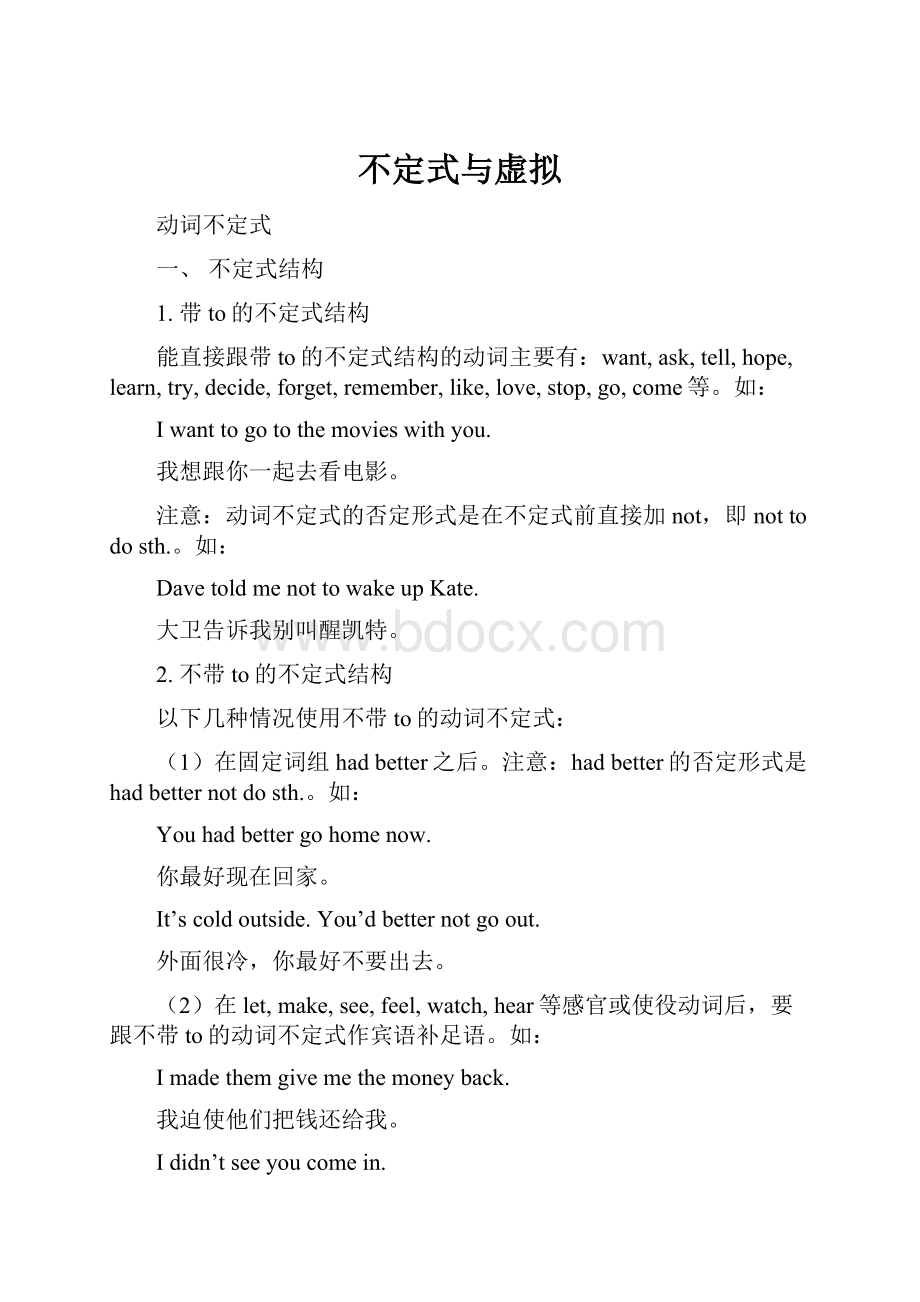不定式与虚拟.docx
《不定式与虚拟.docx》由会员分享,可在线阅读,更多相关《不定式与虚拟.docx(18页珍藏版)》请在冰豆网上搜索。

不定式与虚拟
动词不定式
一、不定式结构
1.带to的不定式结构
能直接跟带to的不定式结构的动词主要有:
want,ask,tell,hope,learn,try,decide,forget,remember,like,love,stop,go,come等。
如:
Iwanttogotothemovieswithyou.
我想跟你一起去看电影。
注意:
动词不定式的否定形式是在不定式前直接加not,即nottodosth.。
如:
DavetoldmenottowakeupKate.
大卫告诉我别叫醒凯特。
2.不带to的不定式结构
以下几种情况使用不带to的动词不定式:
(1)在固定词组hadbetter之后。
注意:
hadbetter的否定形式是hadbetternotdosth.。
如:
Youhadbettergohomenow.
你最好现在回家。
It’scoldoutside.You’dbetternotgoout.
外面很冷,你最好不要出去。
(2)在let,make,see,feel,watch,hear等感官或使役动词后,要跟不带to的动词不定式作宾语补足语。
如:
Imadethemgivemethemoneyback.
我迫使他们把钱还给我。
Ididn’tseeyoucomein.
我没看见你进来。
(3)在引导疑问句的whynot之后。
Whynot+不带to的不定式是Whydon’tyoudo的省略,可以用来提出建议或劝告。
如:
Whynotstudywithus?
为什么不和我们一起学呢?
Whynottakeaholiday?
=Whydon’tyoutakeaholiday?
为什么不休个假呢?
(4)不定式动词在介词but,except,besides后面时,如这些介词前有实义动词do的各种形式,则后接不带to的不定式,否则带to。
如:
Ihavenochoicebuttoacceptthefact.
除了接受这个事实我别无选择。
Whatdoyouliketodobesidesswim?
除了游泳你还喜欢做什么?
(5)为了避免重复,不定式可省去to。
如:
I’mreallypuzzledwhattothinkorsay.
对于想什么或说什么,我真的很困惑。
二、不定式的时态
不定式常用的时态有一般时、完成时、进行时和完成进行时四种,常用的为前三种。
1.一般时todosth.
动词不定式的一般式表示不定式的动作或状态与谓语动词所表示的动作同时发生或在之后发生。
如:
Iplantoattendthemeeting.
我计划参加这次会议。
2.完成时tohavedonesth.
不定式的完成式表示不定式的动作发生在谓语动词表示的动作之前。
如:
Iamsorrytohavekeptyouwaiting.
很抱歉让你久等了。
3.进行时tobedoingsth.
不定式的进行式表示不定式的动作与谓语动词所表示的动作同时发生。
如:
Theyaresaidtobeworkinghard.
据说他们工作得很努力。
4.完成进行时tohavebeendoingsth.
不定式的完成进行式表示不定式的动作在谓语动词之前已经发生,并且一直进行着。
如:
Heissaidtohavebeenworkinginthatfactoryfortwelveyears.
据说他已在那家工厂工作12年了。
三、动词不定式在句中的作用
1.作主语
如:
Toliveistowork.
生活就是工作。
Tosavetimeistolengthenlife.
节约时间就等于延长了人的生命。
不定式结构作主语时,现代英语倾向于采用it作形式主语,而把不定式结构后置的形式。
如:
ItisimportantforstudentstostudyEnglish.
学好英语对学生来说是很重要的。
2.作定语
(1)不定式作定语,要放在它所修饰的名词或代词的后面。
如:
Ihavenothingtosayonthisquestion.
对这个问题我无可奉告。
(2)如果不定式是不及物动词,后面就应有必要的介词。
如:
Givemeapieceofpapertowriteon.给我一张纸写字。
(3)有些名词常可用不定式作定语。
如:
Ourteacherhadnotimetothinkaboutrest.
我们老师根本没时间考虑休息一下。
3.作宾语
Iwishtobeacollegestudent.
我希望成为一名大学生。
有的及物动词要求跟复合宾语(宾语+宾语补足语)。
如果其中的宾语是不定式短语,则必须将形式宾语it放在宾语的位置上,而将不定式短语(真正的宾语)放在宾语补足语之前。
如:
IfinditusefultolearnEnglishwell.
我发现学好英语很有用。
4.作宾语补足语
动词不定式作宾语补足语是动词不定式用法的一个重点,学习时要注意以下三种情况。
(1)作动词ask,like,tell等的宾语补足语时,动词不定式符号to不可以省略。
如:
HeaskedmetotalkaboutEnglishstudy.
他请我谈谈英语学习。
(2)作使役动词let,have,make以及感官动词feel,hear,see,watch等的宾语补足语时,动词不定式符号to要省略。
如:
Theteachermadehimsaythewordlikethis.
老师让他像这样说这个单词。
(3)作动词help的宾语补足语时,动词不定式符号to可以带,也可以不带。
如:
Couldyouhelpme(to)carrytheheavybox?
你能帮我搬这个重箱子吗?
5.作状语
动词不定式及其短语具有副词的特性,可在句中作状语。
(1)作目的状语。
如:
Hestoppedtohavearest.
他停下来休息。
(3)在某些表示喜、怒、哀、乐等的形容词后作原因状语。
如:
I’msorrytohearyourgrandmaisill.
听到你奶奶生病真遗憾。
(4)在带有enough或too的句子里作状语,表程度。
如:
Heisoldenoughtogotoschool.
他到了上学年龄了。
(5)强调动词不定式所表示的目的时,动词不定式可用inorderto或soasto+动词原形,soasto不用于句首。
如:
Thebusstoppedsoastopickuppassengers.
公共汽车停下来以便接乘客。
虚拟语气
英语中的语气分为陈述语气、祈使语气、虚拟语气三类。
虚拟语气表示说话人的主观愿望或假想,所说的是一个条件,不一定是事实,或与事实相反。
条件句可分为两类,一类为真实条件句,一类为非真实条件句。
非真实条件句表示的是假设的或实际可能性不大的情况,故采用虚拟语气。
如果假设的情况可能发生,是真实条件句,这种情况下谓语用陈述语气。
如:
Iftimepermits,we'llgofishingtogether.如果时间允许,我们就一起去钓鱼。
如果假设的情况是不存在的或不大可能发生的,则是虚拟条件句。
如:
Ifyouhadcomeyesterday,youwouldhavemetthatfamousprofessor.如果你昨天来,你就会见到那位著名的教授了。
讲解
I.含有条件状语从句的复合句(以do为例;S=主语)
时间条件状语从句主句
与现在事实相反的假设If+S+did…S+would/should/could/might+do…
与过去事实相反的假设If+S+haddone…S+would/should/could/might+havedone…
与将来事实相反的假设If+Sshoulddo/weretodoS+would/should/could/might+do…
注意事项:
1.倒装句。
如果条件句中含有功能词had,should,were时,可以省去If,把功能词提前,构成倒装句。
2.错综条件句。
若条件句和主句动作不存在同一个时间,则谓语形式应根据具体情况而定。
3.Ifthereweren't/hadnotbeen+…=without…
4.Ifitwerenotfor…/Ifithadn'tbeenfor…=butfor…
5.otherwise+虚拟语气的句子
6.虚拟语气的句子,but+陈述事实的句子
II.虚拟语气用在宾语从句中
sb.did…(希望现在用过去式)
wish+thatsb.haddone…(希望过去用过去完成式)
sb.would/shoulddo(希望将来用过去将来)
wouldrather后的从句要用虚拟语气。
时间从句
虚拟现在were,did(动词一般过去式)
虚拟过去haddone
虚拟将来did(动词一般过去式)
IwouldratherIhadn’tsaidsuchunkindthingstoyou.(虚拟过去)
I'dratheryoucameherefortheanswertomorrowmorning.(虚拟将来)
I’dratheryoupostedtheletterrightaway.(虚拟现在)
3.suggest+(that)S+should+do…
表示愿望、建议、请求等主观意向的动词之后的宾语从句,谓语用should+动词原形,should常常省略。
decide,demand,desire,insist,order,propose,suggest,recommend,requested,require等。
注意:
1.suggest当“建议”讲时,其宾语从句用虚拟语气;当“暗示、表明”时,用陈述语气
2.insist当坚持“看法或建议”时,宾语从句用虚拟语气;当坚持“某个事实”时,用陈述语气。
判断改错:
(错)Yourpalefacesuggeststhatyou(should)beill.(对)Yourpalefacesuggeststhatyouareill.(错)Iinsistedthatyou(should)bewrong.(对)Iinsistedthatyouwerewrong.
III.虚拟语气用在主语从句中
Itisdemanded/necessary/apity+that…等结构的主语从句,谓语动词用should加动词原形,should可省略。
Itis可用的词有三类that(should)do
suggested,ordered,required,proposed,demanded,requested,insisted等
important,necessary,natural,imperative,strange等
apity,ashame,nowonder等
IV.虚拟语气用在同位语从句中。
某些表示建议、请求、命令等主观意向的名词后同位语从句需用虚拟语气,其表达形式为(should)+动词原形。
这类名词常见的有:
advice,suggestion,proposal(提议),order,demand,desire,request,requirement,recommendation(推荐),plan,resolution(决议),idea等。
eg.Weareallforyourproposalthatthediscussion(should)beputoff.
V.虚拟语气用在表语从句中。
某些表示建议、请求、命令等主观意向的名词作主语时,表语从句需用虚拟语气,其表达形式为(should)+动词原形。
这类名词常见的有:
advice,suggestion,proposal,order,demand,desire,request,requirement,recommendation以及plan,idea,resolution等。
eg.Mysuggestionisthatthemayor(should)presenttheprizes.
VI.虚拟语气用在定语从句中
Itis(about/high)time+thatsth/shoulddosth..
eg.Don'tyouthinkit'sabouttimewewenthome?
注:
在thisisthefirsttime/secondtimethat...句型中,从句中谓语动词用陈述语气完成时态。
thisthefirsttimethatyouhavevisitedHongkong?
VII.虚拟语气用在让步、方式、目的状语从句中
1.在带有evenif/eventhough引导的让步状语从句的主从复合句中,主句和从句都用虚拟语气,动词形式与含有非真实条件句的虚拟语气相同。
如:
Evenifhehadbeenill,hewouldhavegonetohisoffice.即使生了病,他俩去办公室。
2.由asif或asthough引导的状语从句表示比较或方式时。
从句谓语形式为动词的过去式(be用were)或“had十过去分词”。
如:
HetreatedmeasifIwereastranger.他那样对待我,好像我是陌生人似的。
Shetalkedaboutthefilmasifshehadreallyseenit.她谈论那部影片,就好像她确实看过一样。
3.虚拟语气用在lest(唯恐、免得),forfearthat及incase引导的目的状语从句中。
在由lest等引导的目的状语从句中需用虚拟语气,表示“以防,以免”等意思,其谓语动词多由should+动词原形构成,should也可省略。
eg.Hewaspunishedlestheshouldmakethesamemistakeagain.
VIII.虚拟语气用情感语言中
1.虚拟语气在表示客气、遗憾以及祝愿等场合中,使用虚拟语气。
shouldn'thavebeenfollowinghimsoclosely;youshouldhavekeptyourdistance.
2.Ifonlysb./sth.+时态后退型的谓语
eg.IfonlyIhadknowntheresultoftheexamination.
IX.虚拟语气的特殊用法:
1.省掉if的条件从句结构:
Hadyouaskedme,Iwouldhavetoldyou.
(=Ifyouhadaskedme,…)
2.有时虚拟条件不用条件从句而用不定式、分词、介词、名词、连接词或定语从句来表示,如:
Atruefriendwouldnotdosuchathing.
(=Ifhewereatruefriend,hewould...)
3.有时条件从句中的动作和结果从句中的动作发生的时间不一致,如:
Ifhehadfollowedthedoctor’sadvice,hewouldbequiteallrightnow.
IfIwereyou,Iwouldhavegonehome.
动词不定式练习
1.Theteachertoldthem________makesomuchnoise.
A.don’t B.not C.willnot D.notto
2.Ourmasteroftentoldus_______thingsforgranted.
A.nottohaveB.nottotakeC.didn’ttake D.nottomake
3.Tellhim_______thewindow.
A.toshutnotB.nottoshutC.tonotshut D.notshut
4.Theboywantedtoridehisbicycleinthestreet,buthismothertoldhim______.
A.notto B.nottodo C.notdoit D.donotto
5.MrsSmithwarnedherdaughter________afterdrinking.
A.nevertodrive B.toneverdriveC.neverdriving D.neverdrive
6.Thepatientwaswarned_______oilyfoodaftertheoperation.
A.toeatnot B.eatingnot C.nottoeat D.noteating
7.Theworkerswantus________togetherwiththem.
A.work B.working C.towork D.worked
8.Theywouldnotallowhim________acrosstheenemyline.
A.toriskgoing B.riskingtogoC.forrisktogo D.riskgoing
9.Isawhim_______outoftheroom.
A.go B.hadgone C.hasgone D.goes
10.Theyknewherverywell.Theyhadseenher_______upfromchildhood.
A.grow B.grew C.wasgrowing D.togrow
11.I’veheardhim_______aboutyouoften.
A.spoke B.speaks C.speak
12.Thoughhehadoftenmadehislittlesister_______,todayhewasmade______byhislittlesister.
A.cry;tocry B.crying;cryingC.cry;cry D.tocry;cry
13.Hewasmade_________.
A.go B.gone C.going D.togo
14.Johnwasmade_______thetruckforaweekasapunishment.
A.towash B.washing C.wash D.tobewashing
15.Pauldoesn’thavetobemade_______.Healwaysworkshard.
A.learn B.tolearn C.learned D.learning
16.There’resomanykindsoftape-recordersonsalethatIcan’tmakeupmymind_______tobuy.A.what B.which C.how D.where
17.Thereisn’tanydifferencebetweenthetwo.Ireallydon’tknow_________.
A.wheretochoose B.whichtochooseC.tochoosewhat D.tochoosewhich
18.“Haveyoudecidedwhen________?
”“Yes,tomorrowmorning.”
A.toleave B.tobeleavingC.willyouleave D.areyouleaving
19.LastsummerItookacourseon________.
A.howtomakedressesB.howdressesbemadeC.howtobemadedressesD.howdressestobemade
20.Hedoesn’tknow______tostayornot.
A.whether B.if C.either D.ifhewill
21.Shepretended_______mewhenIpassedby.
A.nottoseeB.notseeingC.tonotsee D.havingnotseen
22.---Thelightintheofficeisstillon.---Oh,Iforgot_______.
A.turningitoff B.turnitoffC.toturnitoff D.havingturneditoff
23.Weagreed_________herebutsofarshehasn’tturnedupyet.
A.havingmet B.meeting C.tomeet D.tohavemet
24.LittleJimshouldlove_______tothetheatrethisevening.
A.tobetaken B.totake C.beingtaken D.t